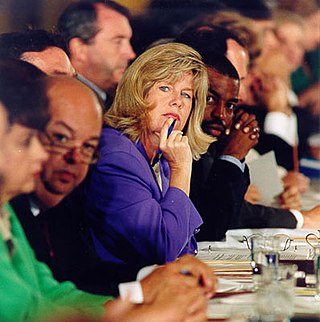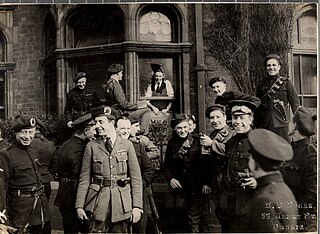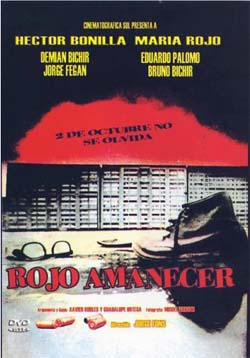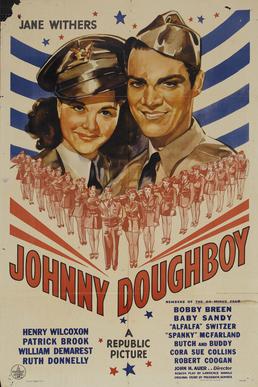
The Parents Music Resource Center (PMRC) was an American committee formed in 1985 with the stated goal of increasing parental control over the access of children to music deemed to have violent, drug-related, or sexual themes via labeling albums with Parental Advisory stickers. The committee was founded by four women known as the "Washington Wives"—a reference to their husbands' connections with government in the Washington, D.C. area. The women who founded the PMRC are Tipper Gore, wife of Senator and later Vice President Al Gore; Susan Baker, wife of Treasury Secretary James Baker; Pam Howar, wife of Washington realtor Raymond Howar; and Sally Nevius, wife of former Washington City Council Chairman John Nevius. The PMRC eventually grew to include 22 participants before shutting down in the mid-to-late 1990s.

"John Brown's Body", originally known as "John Brown's Song", is a United States marching song about the abolitionist John Brown. The song was popular in the Union during the American Civil War. The song arose out of the folk hymn tradition of the American camp meeting movement of the late 18th and early 19th century. According to an 1889 account, the original John Brown lyrics were a collective effort by a group of Union soldiers who were referring both to the famous John Brown and also, humorously, to a Sergeant John Brown of their own battalion. Various other authors have published additional verses or claimed credit for originating the John Brown lyrics and tune.

The "Battle Hymn of the Republic" is an American patriotic song written by the abolitionist writer Julia Ward Howe during the American Civil War.

The Christmas truce was a series of widespread unofficial ceasefires along the Western Front of the First World War around Christmas 1914.

Akka Mahadevi was an early poet of Kannada literature and a prominent member of the Lingayatism founded in the 12th century. Her 430 vachanas, and the two short writings called Mantrogopya and the Yogangatrividh are considered her known contributions to Kannada literature. The term Akka was an honorific given to her by saints such as Basavanna, Siddharama, and Allamaprabhu as an indication of her high place in the spiritual discussions held at the "Anubhava Mantapa". She is regarded to be a major female figure in Kannada literature and in the history of Karnataka. She considered the god Shiva as her husband.

"The Bonnie Blue Flag", also known as "We Are a Band of Brothers", is an 1861 marching song associated with the Confederate States of America. The words were written by the entertainer Harry McCarthy, with the melody taken from the song "The Irish Jaunting Car". The song's title refers to the unofficial first flag of the Confederacy, the Bonnie Blue Flag. The left flag on the sheet-music is the Bonnie Blue Flag.
"Sister Suffragette" is a pro-suffrage protest song pastiche written and composed by Richard M. Sherman and Robert B. Sherman. It was sung by actress Glynis Johns in the role of Mrs. Winifred Banks in the 1964 Disney film Mary Poppins. The song's melody was originally from a scrapped piece called "Practically Perfect", also written and composed by the Sherman Brothers.

"Come Out, Ye Black and Tans" is an Irish rebel song, written by Dominic Behan, which criticises and satirises pro-British Irishmen and the actions of the British army in its colonial wars. Its title refers to the Black and Tans, mainly former British Army soldiers, who reinforced the Royal Irish Constabulary (RIC) during the Irish War of Independence and committed many acts of violence and terror against the Irish population.
"Sussex by the Sea" is a song written in 1907 by William Ward-Higgs, often considered to be the unofficial county anthem of Sussex. It became well known throughout Sussex and is regularly sung at celebrations throughout the county. It can be heard during many sporting events in the county, during the Sussex bonfire celebrations and it is played by marching bands and Morris dancers across Sussex. It is the adopted song of Brighton & Hove Albion Football Club, Sussex Division Royal Naval Reserve, Sussex Association of Naval Officers and Sussex County Cricket Club.
"Over the Hills and Far Away" is a traditional English song, dating back to at least the late 17th century. Two versions were published in the fifth volume of Thomas D'Urfey's Wit and Mirth, or Pills to Purge Melancholy; a version that is similar to the second Wit and Mirth one appears in George Farquhar's 1706 play The Recruiting Officer. A further version appears in John Gay's The Beggar's Opera of 1728.

Rojo Amanecer is a 1989 Silver Ariel Award-winning Mexican crime drama film, directed by Jorge Fons.
Robert Patrick Weston was an English songwriter. He was responsible for many successful songs and comic monologues between the 1900s and 1930s, mostly written in collaboration with other writers, notably Fred J. Barnes and Bert Lee, and performed successfully by Harry Champion, Stanley Holloway, and Gracie Fields, among others.
![<i>The Seven Ravens</i> (1937 film) 1937 [[Nazi Germany]] film](https://upload.wikimedia.org/wikipedia/en/b/b8/Thesevenravens.jpg)
The Seven Ravens is a German stop motion-animated fairy tale film directed by the Diehl brothers. It was released in Germany on 2 December 1937. The film is notable for being an animated feature film based on a Grimm brothers' fairy tale of the same name, premiering only a few weeks before Walt Disney's Snow White and the Seven Dwarfs. In that respect it is often cited as one of the first animated feature films.

Herman Darewski was a British composer and conductor of light music. His most successful work was perhaps The Better 'Ole, which ran for over 800 performances in its original London production in 1917. Some of his songs became very successful in musical revues.

Aliya Nurmukhambetovna Moldagulova was a Soviet sniper in the Red Army during World War II who killed over 30 Nazi soldiers. After dying of wounds sustained in battle on 14 January 1944, she was posthumously awarded the title Hero of the Soviet Union.

Johnny Doughboy is a 1942 American black-and-white musical comedy film directed by John H. Auer for Republic Pictures. It stars Jane Withers in a dual role as a 16-year-old actress who is sick of playing juvenile roles, and her lookalike fan who is persuaded by a group of "has-been" child stars to perform with them in a U.S. troop show. The film features cameos by ex-child stars Bobby Breen, Carl "Alfalfa" Switzer, George "Spanky" McFarland, Baby Sandy, and others. It received an Academy Award nomination for Best Musical Score.
"I Wanna Learn a Love Song" is a song written and performed by Harry Chapin. The song was included on his 1974 album, Verities & Balderdash. The song is about a guitar teacher who gives guitar lessons to a woman who is falling in love with him.
The Wild Swans is a 1977 Japanese anime fantasy film produced by Toei Animation, based on the Brothers Grimm's fairy tale The Six Swans and on Hans Christian Andersen's variation The Wild Swans. The film was first shown in Japan on 19 March 1977 in the Toei Manga Matsuri.

Berta Berkovich Kohút was a Czechoslovakian-born survivor of the Auschwitz concentration camp. By the time of her death in 2021, she was the last surviving seamstress who lived through internment at the camp by creating dresses for the wives of Nazi officers.
Dancing Around is a two-act musical revue with music by Sigmund Romberg and Harry Carroll and lyrics and book by Harold Atteridge. The production was "the first show in which Al Jolson received top billing from the start." As a revue, the score features songs from multiple composers and lyricists, notably featuring the songs "Sister Susie's Sewing Shirts for Soldiers" and "It's a Long Way to Tipperary." However, the Grace Leboy song "Everybody Rag With Me", commonly associated with the musical in sheet music and recordings popularized by Jolson, did not appear in the original production, but rather was added during a tour. Jolson appeared in blackface, performing the "Everybody Rag With Me" number and the encore without the makeup. Performances began at the Winter Garden Theatre in New York on October 10, 1914, running for 145 performances before closing on February 13, 1915.









![<i>The Seven Ravens</i> (1937 film) 1937 [[Nazi Germany]] film](https://upload.wikimedia.org/wikipedia/en/b/b8/Thesevenravens.jpg)



